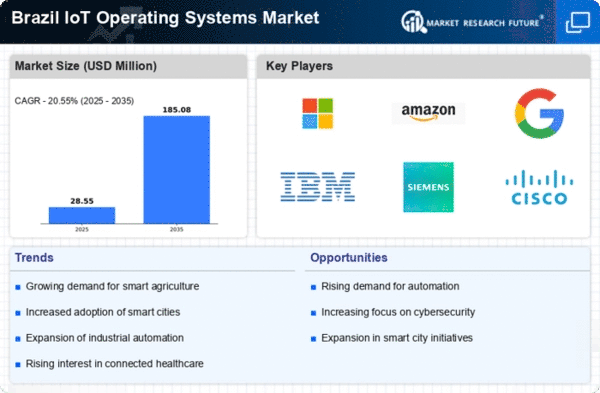Emergence of Edge Computing
The rise of edge computing is reshaping the landscape of the iot operating-systems market in Brazil. As organizations increasingly adopt edge computing solutions to process data closer to the source, the demand for operating systems that support these architectures is growing. Edge computing reduces latency and bandwidth usage, making it particularly appealing for applications requiring real-time data processing. In 2025, it is anticipated that the edge computing market in Brazil will witness a growth rate of over 30%, further driving the need for specialized operating systems. This shift towards decentralized computing environments presents opportunities for innovation within the iot operating-systems market, as developers create systems optimized for edge deployments.
Rising Focus on Data Analytics
The growing emphasis on data analytics in Brazil is driving the demand for advanced iot operating-systems. As organizations seek to harness the power of data generated by IoT devices, the need for operating systems that can efficiently process and analyze this information becomes critical. In 2025, it is projected that the data generated by IoT devices in Brazil will exceed 500 exabytes, necessitating robust operating systems capable of managing such vast amounts of data. This trend indicates a shift towards operating systems that not only facilitate connectivity but also provide integrated analytics capabilities. Consequently, the iot operating-systems market is likely to evolve, with a focus on systems that enhance data-driven decision-making and operational efficiency.
Growing Adoption of Smart Devices
The increasing proliferation of smart devices in Brazil is a primary driver for the iot operating-systems market. As consumers and businesses alike embrace smart technologies, the demand for robust operating systems that can efficiently manage these devices escalates. In 2025, it is estimated that the number of connected devices in Brazil will reach approximately 1 billion, indicating a substantial market opportunity. This surge necessitates operating systems that can handle diverse applications, ensuring seamless connectivity and functionality. Furthermore, the integration of smart devices into everyday life, from home automation to industrial applications, underscores the need for specialized operating systems tailored to these environments. Consequently, the iot operating-systems market is poised for significant growth as manufacturers and developers respond to this rising demand.
Government Initiatives and Support
Brazilian government initiatives aimed at promoting digital transformation and smart city projects are significantly influencing the iot operating-systems market. With investments in infrastructure and technology, the government is fostering an environment conducive to the growth of IoT solutions. For instance, the National IoT Plan outlines strategies to enhance connectivity and innovation across various sectors. This governmental support is likely to stimulate the development of operating systems that cater to specific regulatory and operational requirements. As a result, the iot operating-systems market is expected to benefit from increased funding and resources, enabling the creation of more sophisticated and compliant solutions that align with national objectives.
Increased Investment in Smart Infrastructure
Investment in smart infrastructure across Brazil is a crucial driver for the iot operating-systems market. As cities and industries modernize their infrastructure, the integration of IoT technologies becomes essential for enhancing efficiency and sustainability. Projects focused on smart transportation, energy management, and public safety are gaining traction, leading to a heightened demand for operating systems that can support these initiatives. In 2025, it is projected that Brazil will allocate over $10 billion towards smart city projects, which will likely necessitate the development of specialized operating systems tailored to these applications. This influx of investment is expected to catalyze growth within the iot operating-systems market, as stakeholders seek solutions that can effectively manage and optimize smart infrastructure.
















